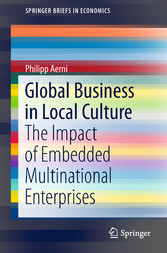
Global Business in Local Culture - The Impact of Embedded Multinational Enterprises

von: Philipp Aerni
Springer-Verlag, 2018
ISBN: 9783030037987
Sprache: Englisch
132 Seiten, Download: 1505 KB
Format: PDF, auch als Online-Lesen
| Preface | 6 | ||
| Contents | 11 | ||
| Acronyms | 14 | ||
| 1 Introduction | 16 | ||
| 1.1 Karl Polanyi’s Influence in the Globalization Debate of the 21st Century | 18 | ||
| 1.2 The Bipolar Mindset in Academia, Civil Society and Government | 19 | ||
| 1.3 Acknowledging the Value of Companies Committed to ‘Principled Embeddedness’ | 21 | ||
| 1.4 When MNEs Become Part of the Solution Rather Than Part of the Problem | 23 | ||
| 1.5 Of Myths and Movements | 24 | ||
| 2 Societal Foundations of Economic Development | 27 | ||
| 2.1 Polanyi as the Common Denominator of Post-structuralism and Neoclassical Economics | 28 | ||
| 2.2 No Such Thing as a ‘Globalization Paradox’ | 28 | ||
| 2.3 Polanyi as ‘Intellectual Guide’ in Economics and Anthropology | 32 | ||
| 3 Neoliberalism: A Mythical and Meaningful Term Devoid of Any Deep Thought | 34 | ||
| 3.1 Did the Rent-Seeking Economy of Feudalism Serve the Needs of the People? | 35 | ||
| 3.2 The Enclosure Movement in the UK as the Beginning of Industrial Agriculture | 36 | ||
| 3.3 Blaming Agricultural Trade Has Never Solved Any Food Security Problem | 37 | ||
| 3.4 Fernand Braudel’s Criticism of Polanyi’s Interpretation of History | 38 | ||
| 3.5 Why Polanyi’s Bipolar Framing Finds Fertile Ground | 39 | ||
| 4 The Impact of Popular Stereotypes in Academic Research and Public Policy | 42 | ||
| 4.1 Echo Chambers: The Attack on Democracy from Within | 43 | ||
| 4.2 Embedded Liberalism: A Flawed Concept | 44 | ||
| 4.2.1 The Artificial Separation of the ‘Authentic’ Local from the ‘Generic’ Global Product | 45 | ||
| 4.2.2 Governments as the Blameless Defenders Against Careless Big Business | 46 | ||
| 4.2.3 Why More Regulation Does not Lead to More Public Trust: The Case of GMOs | 47 | ||
| 4.2.4 Self-Regulation in Industry as a Base for Subsequent Government Regulation | 48 | ||
| 4.2.5 Why the Ruggie Framework May Not Be Harmless | 48 | ||
| 4.3 Indigenous Communities as Projection Screens for Preserved Cultural Embeddedness | 49 | ||
| 4.3.1 How the Indian Chipko Movement Became a Symbol of NIMBY Environmentalism | 51 | ||
| 4.3.2 Myths Embodied in Scientific Models that Guide Academic Research | 54 | ||
| 4.3.3 ‘Epistemic Brokers’ in Postmaterial Societies: The Case of Vandana Shiva | 56 | ||
| 4.3.4 Cultural Appropriation and Denial of Local Agency | 59 | ||
| 4.3.5 The Temptation in Academia to Uncritically Embrace Environmental Narratives | 61 | ||
| 5 The New Understanding of the Term ‘Embeddedness’ in Economic Sociology | 63 | ||
| 5.1 The Moral Dimension of Entrepreneurship | 64 | ||
| 5.2 Embeddedness as a Way to Address Three Major Coordination Problems | 64 | ||
| 5.3 Value as a Coordination Problem | 65 | ||
| 5.4 Competition as a Coordination Problem | 66 | ||
| 5.5 Cooperation as a Coordination Problem | 68 | ||
| 5.6 Embeddedness in the Context of Economic Complexity | 70 | ||
| 6 Economic Globalization as a “Disembedding” Force? | 72 | ||
| 6.1 Why Disembedding Traditional Structures May Help Outsiders | 73 | ||
| 6.2 Disembedding Post-Colonial Structures | 74 | ||
| 6.3 How FDI Contributed to Catch-up Growth and Economic Empowerment | 75 | ||
| 6.4 ‘Knowledge’, an Underused Resource in Efforts to Cope with Environmental Challenges | 77 | ||
| 6.5 The Failure of Foreign Aid to Empower Local Entrepreneurs Through Economic Integration | 78 | ||
| 6.5.1 Self-Serving Nature of Swiss Sustainable Trade Promotion and Development Research | 79 | ||
| 6.5.2 How the Anti-business Rhetoric of Epistemic Brokers Supports Incumbents | 82 | ||
| 6.5.3 Local Growth-Oriented Entrepreneurs as Drivers of Economic Integration | 82 | ||
| 7 Embedded MNEs and Their Contribution to Sustainable Change | 84 | ||
| 7.1 Coping with Business Coordination Problems Through a Strategy of ‘Principled Embeddedness’ | 85 | ||
| 7.2 The UNGP and Its Potential Conflict with Principled Embeddedness | 86 | ||
| 7.3 The Role of Subsidiaries of MNEs in Developing Countries | 87 | ||
| 7.4 Selected Cases of ‘Principled Embeddedness’ of Subsidiaries of MNEs | 88 | ||
| 7.4.1 Nestlé Philippines: An Locally Embedded Company | 89 | ||
| 7.4.2 Syngenta’s Contribution to Capacity Development for Agricultural Innovation | 90 | ||
| 7.4.3 Bata Shoes: Creating Welfare by Taking Rather Than Avoiding Risk | 92 | ||
| 7.4.4 The Responsible Entrepreneur and the Selfless Communist | 94 | ||
| 7.4.5 Chiquita: A Pioneer in Sustainable Banana Production with a Legacy Problem | 95 | ||
| 7.4.6 The Problem with Business to Consumer Labels in Agriculture | 97 | ||
| 7.5 Embeddedness and Its Link to Sustainability and Corporate Responsibility | 98 | ||
| 8 Development Cooperation as a Catalyst for Sustainable Long-Term FDI | 100 | ||
| 8.1 How Development Assistance (DA) Could Encourage Foreign Direct Investment (FDI) | 102 | ||
| 8.1.1 Sourcing Ingredients for Beer Production in Uganda | 103 | ||
| 8.1.2 Empowering Pastoralists Through Business Development in Kenya | 104 | ||
| 8.1.3 Enabling Access to Finance: The Case of Vodafone | 105 | ||
| 8.2 Lessons Learned from Public-Private Partnerships (PPPs) | 107 | ||
| 9 Concluding Remarks | 109 | ||
| References | 121 |







